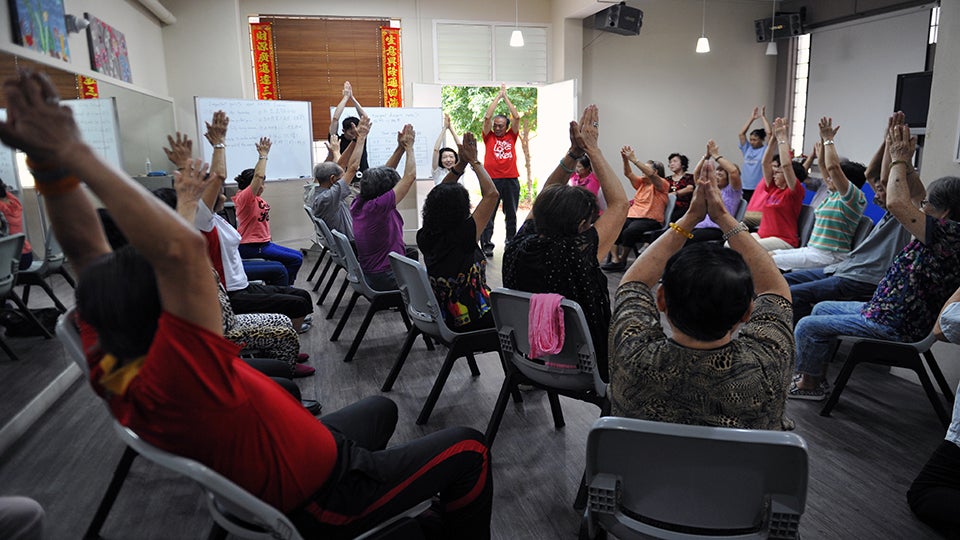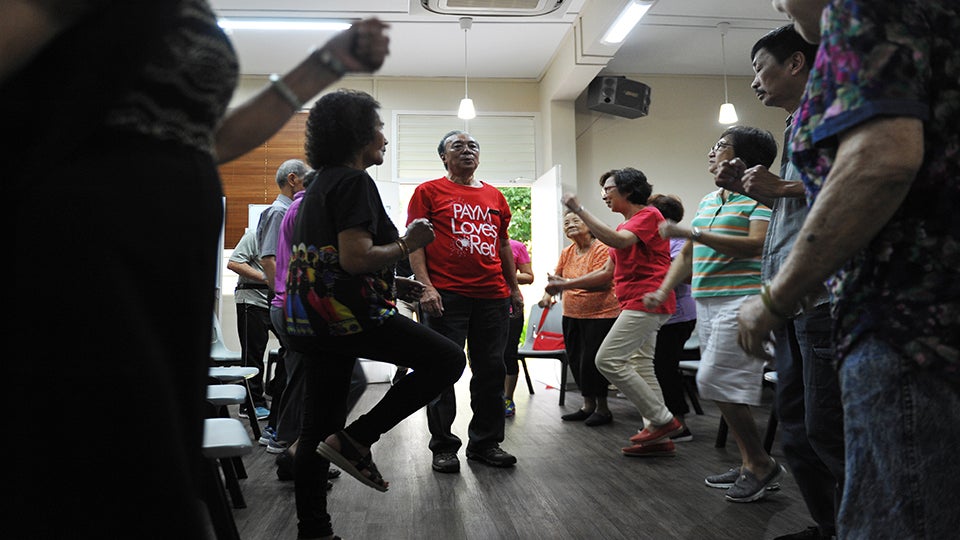New initiative to help seniors delay frailty
Published: 24 Aug 2017

A recent study of 1051 older adults in Bukit Panjang by Associate Professor Reshma Merchant, Division Head of Geriatric Medicine at the NUS Yong Loo Lin School of Medicine (NUS Medicine), revealed that 37 per cent of the cohort were on the edge of becoming frail. Of this group, 6 per cent were found to be frail, while another 8 per cent suffered from cognitive impairment.
The same study found that while 91 per cent of robust older adults were independent in their activities of daily living, only 72 per cent of pre-frail and 50 per cent of frail participants were still independent in bathing, showering, eating, transferring and walking. Frailty and dementia are important health concerns in a rapidly ageing Singapore, with social and economic implications. The World Health Organisation’s definition of Healthy Ageing is developing and maintaining functional ability.
Frailty is characterised by diminished strength, endurance and physiological function, increasing vulnerability to both internal and external stressors, vulnerability to a higher risk of negative health-related outcomes (including falls, hospitalisations, disability, institutionalisation and mortality) as well as underlying memory problems. Frail, elderly people had much worse outcomes in terms of falls, muscle strength, walking speed and quality of life. The NUS study showed that 10 per cent of pre-frail and 20 per cent of frail participants had underlying cognitive impairment.
The study, concluded last year, prompted Assoc Prof Merchant to research ways to help these residents combat frailty and dementia. Frailty has three components which need to be addressed, including cognitive frailty, physical frailty and social frailty. It led to the launch of the Healthy Ageing Promotion Programme For You (HAPPY) programme, a comprehensive and holistic multi-component intervention targeted at seniors aged 60 years old and above, whilst anybody at risk below this age can participate too.
“Almost half of our older population is either frail or pre-frail and many of them are still independent in activities of daily living. We want them to maintain their functional ability and lead a good quality of life and hence the HAPPY programme,” she said.
The programme aims to help elderly persons maintain good physical and mental health, by preventing memory decline and delaying the onset of disability. HAPPY will address all three components, physical, social and cognitive frailty. Even a small reduction in the prevalence of dementia and disability will lead to better quality of life for individuals and lower the cost to society as a whole.
Adapted from Cognicise – a multi-component exercise programme designed by the National Center for Geriatrics and Gerontology (NCGG) in Nagoya, Japan to stimulate cognitive functions and prevent dementia, the locally-customised HAPPY programme features dual-task exercises (a combination of physical exercise and mind training performed in groups) and cognitive tasks of varying complexity, along with advice on healthy ageing and diet.
Since August 2017, the HAPPY programme has been implemented in senior activity centres in the western region of Singapore. “While we are evaluating the effectiveness of the programme, we are also training senior volunteers to lead senior participants in executing the dual-task exercise, and share tips on healthy ageing and nutrition,” Assoc Prof Merchant added. More than 50 seniors have benefitted from the programme so far, and she expects more than 1,000 seniors to benefit from the programme in the next two years.
To evaluate the success of the HAPPY programme, the team will be measuring memory, mobility, strength and functional ability of the participants before and after the exercises. In addition, they will also be monitoring take up and compliance rates, as well as behaviour change, motivation, goal setting and self-empowerment. “Our ultimate goal is for them to be HAPPY and age successfully,” said Assoc Prof Merchant.
Beyond raising awareness of frailty and dementia, the HAPPY programme’s team members will focus on working with community partners in screening for memory impairment and frailty among seniors, and recommending interventions, as well as building sustainable capabilities of community partners to manage these conditions in the long term. The team plans to develop manuals and videos to train more senior volunteers, in their effort to expand the HAPPY programme to communities nationwide.
Read more at NUS Highlights and see press release.
News Coverage
- The Straits Times, 24 August 2017, Home, pB6
- TODAY, 24 August 2017, p15
- Lianhe Zaobao, 24 August 2017
- Tamil Murasu, 24 August 2017, p2
- Berita, 24 August 2017
- Suria News Online, 24 August 2017
- Capital 95.8FM, 24 August 2017
- Warna 94.2FM, 24 August 2017
- 938LIVE, Body & Soul, 29 August 2017


